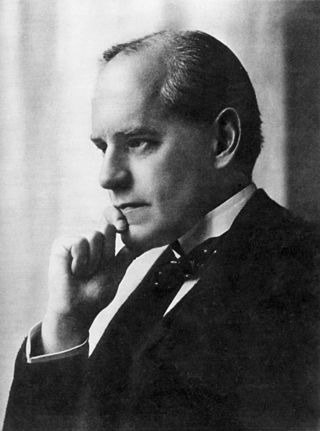
John Galsworthy was an English novelist and playwright. He is best known for his trilogy of novels collectively called The Forsyte Saga, and two later trilogies, A Modern Comedy and End of the Chapter. He was awarded the 1932 Nobel Prize in Literature.
Clerical celibacy is the requirement in certain religions that some or all members of the clergy be unmarried. Clerical celibacy also requires abstention from deliberately indulging in sexual thoughts and behavior outside of marriage, because these impulses are regarded as sinful. Vows of celibacy are generally required for monks and nuns in Christianity, Buddhism, Hinduism, Jainism and other religions, but often not for other clergy.

Bleak House is a novel by Charles Dickens, first published as a 20-episode serial between March 1852 and September 1853. The novel has many characters and several subplots, and is told partly by the novel's heroine, Esther Summerson, and partly by an omniscient narrator. At the centre of Bleak House is a long-running legal case in the Court of Chancery, Jarndyce and Jarndyce, which comes about because a testator has written several conflicting wills. In a preface to the 1853 first edition, Dickens said there were many actual precedents for his fictional case. One such was probably Thellusson v Woodford, in which a will read in 1797 was contested and not determined until 1859. Though many in the legal profession criticised Dickens's satire as exaggerated, Bleak House helped support a judicial reform movement that culminated in the enactment of legal reform in the 1870s.

Ada Cambridge, later known as Ada Cross, was an English-born Australian writer. She wrote more than 25 works of fiction, three volumes of poetry and two autobiographical works. Many of her novels were serialised in Australian newspapers but never published in book form. While she was known to friends and family by her married name, Ada Cross, her newspaper readers knew her as A.C. She later reverted to her maiden name, Ada Cambridge, and that is how she is known today.
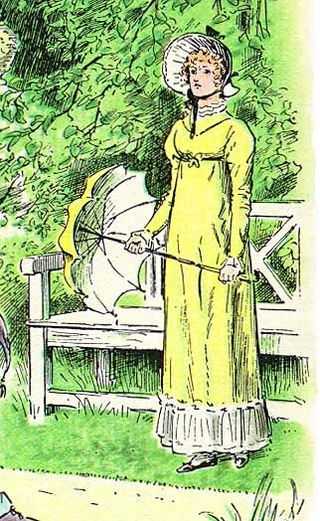
Elizabeth Bennet is the protagonist in the 1813 novel Pride and Prejudice by Jane Austen. She is often referred to as Eliza or Lizzy by her friends and family. Elizabeth is the second child in a family of five daughters. Though the circumstances of the time and environment push her to seek a marriage of convenience for economic security, Elizabeth wishes to marry for love.
Textualism is a formalist theory in which the interpretation of the law is based exclusively on the ordinary meaning of the legal text, where no consideration is given to non-textual sources, such as intention of the law when passed, the problem it was intended to remedy, or significant questions regarding the justice or rectitude of the law.
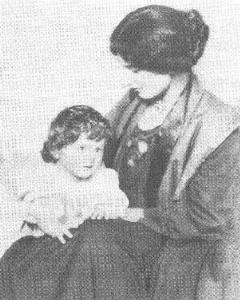
Amber Blanco White was a New Zealand-born British feminist writer and scholar.
Antonia White was a British writer and translator, known primarily for Frost in May, a semi-autobiographical novel set in a convent school. It was the first book reissued by Virago Press in 1978, as part of their Modern Classics series of books by previously neglected women authors.

One of Ours is a 1922 novel by Willa Cather that won the 1923 Pulitzer Prize for the Novel. It tells the story of the life of Claude Wheeler, a Nebraska native in the first decades of the 20th century. The son of a successful farmer and an intensely pious mother, he is guaranteed a comfortable livelihood. Nevertheless, Wheeler views himself as a victim of his father's success and his own inexplicable malaise.
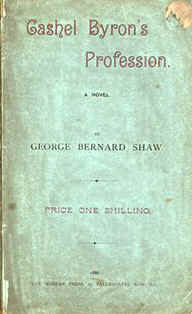
Cashel Byron's Profession is George Bernard Shaw's fourth novel. The novel was written in 1882 and after rejection by several publishers it was published in serialized form in a socialist magazine. The novel was later published as a book in England and the United States. Shaw wrote five novels early in his career and then abandoned them to pursue politics, drama criticism and eventually play writing. The Admirable Bashville (1901), a short play based loosely on this novel, was written to protect American copyrights after the novel became unexpectedly successful in the United States.
Clerical celibacy is the discipline within the Catholic Church by which only unmarried men are ordained to the episcopate, to the priesthood in the Latin Church, and similarly to the diaconate. In other autonomous particular churches, the discipline applies only to the episcopate. According to Jason Berry of The New York Times, "The requirement of celibacy is not dogma; it is an ecclesiastical law that was adopted in the Middle Ages because Rome was worried that clerics' children would inherit church property and create dynasties." For several hundred years after the imposition of celibacy on secular (non-monastic/religious) clergy the sale of church offices continued. The first male issue of non-married concubines of celibate clergy became set to continue the dynasty. To curtail this clerical abuse, the Latin Church imposed a ban on the ordination of bastards. This policy ended almost 800 years later in the 20th century.
Luigia Polzelli was an Italian mezzo-soprano, who sang at the Esterházy court in Hungary during the late 18th century. She was for a number of years the lover of the composer Joseph Haydn.

Mildred Delores Loving and Richard Perry Loving were an American married couple who were the plaintiffs in the landmark U.S. Supreme Court case Loving v. Virginia (1967). Their marriage has been the subject of three movies, including the 2016 drama Loving, and several songs. The Lovings were criminally charged with interracial marriage under a Virginia statute banning such marriages, and were forced to leave the state to avoid being jailed. They moved to Washington, D.C., but wanted to return to their home town. With the help of the American Civil Liberties Union (ACLU), they filed suit to overturn the law. In 1967, the Supreme Court ruled in their favor, striking down the Virginia statute and all state anti-miscegenation laws as unconstitutional, for violating due process and equal protection of the law under the Fourteenth Amendment. On June 29, 1975, a drunk driver struck the Lovings' car in Caroline County, Virginia. Richard was killed in the crash, at the age of 41. Mildred lost her right eye.
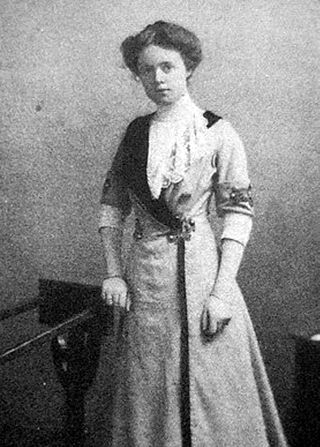
Ida Alexa Ross Wylie, known by her pen name I.A.R. Wylie, was an Australian-British-American novelist, screenwriter, short story writer, poet, and suffragette sympathiser who was honored by the journalistic and literary establishments of her time, and received international recognition for her works. Between 1915 and 1953, more than thirty of her novels and stories were adapted into films, including Keeper of the Flame (1942), which was directed by George Cukor and starred Spencer Tracy and Katharine Hepburn.

Princess Alice was Grand Duchess of Hesse and by Rhine from 13 June 1877 until her death in 1878 as the wife of Grand Duke Louis IV. She was the third child and second daughter of Queen Victoria of the United Kingdom and Prince Albert of Saxe-Coburg and Gotha. Alice was the first of Queen Victoria's nine children to die, and one of three to predecease their mother, who died in 1901. Her life had been enwrapped in tragedy since her father's death in 1861.

The corset controversy was a moral panic and public health concern around corsets in the 19th century.

Alfred Thompson "Tom" Denning, Baron Denning,, was an English barrister and judge. He was called to the bar of England and Wales in 1923 and became a King's Counsel in 1938. Denning became a judge in 1944 when he was appointed to the Probate, Divorce and Admiralty Division of the High Court of Justice, and transferred to the King's Bench Division in 1945. He was made a Lord Justice of Appeal in 1948 after less than five years in the High Court. He became a Lord of Appeal in Ordinary in 1957 and after five years in the House of Lords returned to the Court of Appeal as Master of the Rolls in 1962, a position he held for twenty years. In retirement he wrote several books and continued to offer opinions on the state of the common law through his writing and his position in the House of Lords.
The purposive approach is an approach to statutory and constitutional interpretation under which common law courts interpret an enactment within the context of the law's purpose.

William Cole, was a Cambridgeshire clergyman and antiquary, known for his extensive manuscript collections on the history of Cambridgeshire and of Buckinghamshire.
Maria Stuart Collins (nee Proctor) (c. 1760 – c. 1830) was a novelist and the editor of the abridged version of An Account of the English Colony in New South Wales, one of the most important contemporary historical documents recording the First Fleet and development of Sydney from its early days as a convict colony. Her correspondence with her husband's family survives and provided insights on the life for an officer's wife who was separated from her husband for a long time, while he was overseas on colonial business. Maria was born in Halifax, Nova Scotia, c. 1760. She married David Collins, an English marine officer, in 1777 in Halifax. She gave birth to a daughter in 1778 who died in infancy. Although born to one of the most prominent Nova Scotia families, Maria was in great financial distress after her husband's death in 1810, and petitioned the UK government for a number of years before being awarded a pension. She died in Stonehouse, near Plymouth, Devon, Great Britain, in about 1830.













